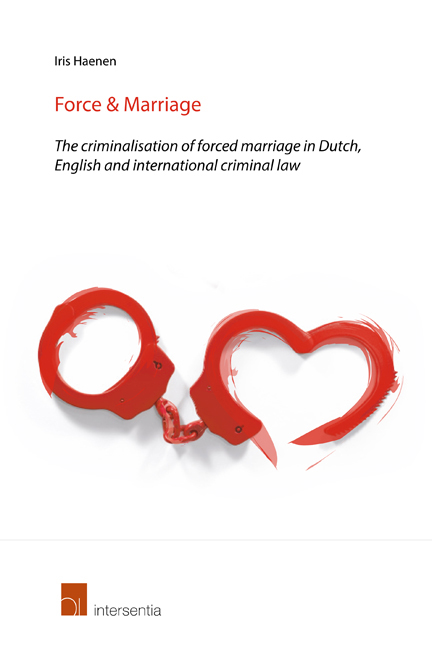 Force & Marriage
Force & Marriage Book contents
- Frontmatter
- Acknowledgements
- Contents
- Abbreviations
- General introduction
- PART I FORCE AND MARRIAGE: Description and definition of forced marriage
- PART II A TALE OF TWO THEORIES: Criminalisation on the level of national law and international law
- Chapter 4 National criminalisation
- Chapter 5 International criminalisation
- Chapter 6 Comparing national and international criminalisation
- PART III THE LAW AND FORCED MARRIAGE: Legal frameworks concerning forced marriage in Dutch, English and international criminal law
- PART IV ANALYSIS AND CONCLUSIONS
- Summary
- Bibliography
- Table of cases
- Curriculum vitae
- Index
Chapter 5 - International criminalisation
from PART II - A TALE OF TWO THEORIES: Criminalisation on the level of national law and international law
Published online by Cambridge University Press: 22 November 2017
- Frontmatter
- Acknowledgements
- Contents
- Abbreviations
- General introduction
- PART I FORCE AND MARRIAGE: Description and definition of forced marriage
- PART II A TALE OF TWO THEORIES: Criminalisation on the level of national law and international law
- Chapter 4 National criminalisation
- Chapter 5 International criminalisation
- Chapter 6 Comparing national and international criminalisation
- PART III THE LAW AND FORCED MARRIAGE: Legal frameworks concerning forced marriage in Dutch, English and international criminal law
- PART IV ANALYSIS AND CONCLUSIONS
- Summary
- Bibliography
- Table of cases
- Curriculum vitae
- Index
Summary
INTRODUCTION
In this chapter, a framework is constructed that will assist in answering the central research question: should forced marriage be criminalised under international criminal law, more specifically under the Rome Statute and, if so, how? The structure of the chapter resembles a funnel: starting with international criminal law in the broadest sense, the focus is narrowed down to the core international crimes (i.e. crimes against humanity, war crimes and genocide) and then further specified to particular acts listed in the provisions of the core crimes. The first part of this chapter focuses on the doctrinal foundations of international criminalisation: what circumstances raise conduct to the level of an international crime in the first place? As a relatively new field of law, international criminal law does not have the same number of crystallised theories regarding the criminalisation process that domestic legal systems have and over the years, conduct was mostly criminalised on a spasmodic ad hoc basis. It has even been argued that there is – or at least was – no common doctrinal foundation that constitutes the legal basis for international criminalisation. Nonetheless, several authors have made an effort to formulate such a doctrinal basis and these theories will be studied and form the point of departure for the evaluative framework. Next, the taxonomy of international criminalisation and the structure of the core crimes will be highlighted in order to demonstrate the differences between the core crimes.
After the required knowledge about international criminalisation has been acquired, a road map pertaining to the question of how criminal conduct ought to be criminalised is constructed. This framework focuses on the possibilities of criminalising conduct as a crime against humanity, a war crime and an act of genocide. Because of the focus on three different core crimes, the framework presented in this chapter consists of three parts. Each crime has its own checklist of criteria that must be fulfilled in order for conduct to be criminalised as such a crime, yet some overlap between the criteria does exist.
- Type
- Chapter
- Information
- Force & MarriageThe criminalisation of forced marriage in Dutch, English and international criminal law, pp. 137 - 184Publisher: IntersentiaPrint publication year: 2014


